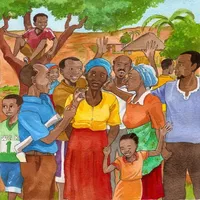(Decision) القرار
decision|The decision
besluit|
(Entscheidung)
(Decision)
(Decisión)
(Décision)
(Decisione)
(決断)
(결정)
(Beslissing)
(Decisão)
(Решение)
(Beslut)
(Karar)
القرار
the decision
de beslissing
the decision
كان لقريتي العديد من المشاكل.
|my village had|many||many problems
was|mijn dorp|many|van|problemen
Mein Dorf hatte viele Probleme.
My village had many problems.
Minha aldeia teve muitos problemas.
Köyümün birçok sorunu vardı.
فنحن نقف صفًا طويلاً لنجلب الماء من صنبور واحد.
So we|stand|in a line|long line|to fetch|the water|from|faucet|one faucet
want wij|we staan|rij|lang|om water te halen|water|bij|kraan|
Wir stehen lange in der Schlange, um Wasser aus einem Wasserhahn zu bekommen.
We stand in a long line to fetch water from one tap.
Nous faisons la queue pour aller chercher de l’eau à un robinet.
Ficamos muito tempo na fila para tirar água de uma torneira.
Bir musluktan su almak için uzun bir sırada duruyoruz.
وننتظر المعونات من الآخرين.
And we wait|the aid||the others
We wachten op|hulpbronnen||anderen
Wir warten auf die Hilfe anderer.
We are waiting for help from others.
Nous attendons l'aide des autres.
Estamos esperando a ajuda de outras pessoas.
Başkalarından yardım bekliyoruz.
ونغلق أبواب منازلنا باكرًا خوفاً من اللصوص.
and we lock|doors|our homes|early|for fear of||thieves
sluiten|deuren|huizen|vroeg|uit vrees||dieven
Aus Angst vor Dieben schließen wir die Türen unserer Häuser frühzeitig.
We close the doors of our homes early for fear of thieves.
Fechamos as portas de nossas casas cedo por medo de ladrões.
ترك العديد من الأطفال المدرسة.
left|many||children|the school
verlaten|veel|van|kinderen|de school
Viele Kinder brachen die Schule ab.
Many children have left school.
Muitas crianças abandonaram a escola.
والفتيات الصغيرات يعملن خادمات في القرى الأخرى.
"the young girls"|young girls|work|maids||the villages|other villages
de meisjes|de kleine|werken|dienstmeisjes||dorpen|
In anderen Dörfern arbeiten junge Mädchen als Dienstmädchen.
Young girls work as maids in other villages.
As raparigas trabalham como empregadas domésticas noutras aldeias.
يتسكع الصِبية الصغار في جميع أنحاء القرية، بينما يعمل الآخرون في مزارع الناس.
loiter|the young boys|young children||all over|around||while||the others||farms|
Die Jungen hängen im Dorf herum, während die anderen auf den Bauernhöfen der Menschen arbeiten.
Young boys hang around the village, while others work on people's farms.
Les jeunes garçons traînent dans le village, tandis que d'autres travaillent dans les fermes des gens.
Genç erkekler köyün etrafında dolanırken, diğerleri insanların çiftliklerinde çalışıyor.
عندما تهب الرياح، تعلق مخلفات الأوراق على الأشجار والأسوار.
|"blow"|the wind|get stuck|debris|leaves||the trees|and the fences
Wenn der Wind weht, hängen Laubabfälle an Bäumen und Zäunen.
When the wind blows, leaf litter hangs on trees and fences.
Lorsque le vent souffle, les feuilles mortes s’accrochent aux arbres et aux clôtures.
Rüzgar estiğinde, yapraklar ağaçlara ve çitlere asılır.
يجرح الناس بالزجاج المكسور المهمل.
"injures"||with glass|broken|neglected
Menschen werden durch zerbrochenes, weggeworfenes Glas verletzt.
People are injured by discarded broken glass.
Des personnes sont blessées par des débris de verre jetés.
İnsanlar atılan kırık camlardan yaralanıyor.
وفي أحد الأيام جف الصنبور، وأصبحت أوعيتنا فارغة.
And on one||the days|dried up|the faucet|"became"|our containers|empty
Eines Tages lief der Wasserhahn trocken und unsere Behälter waren leer.
One day the tap ran dry, and our containers were empty.
Un jour, le robinet s'est tari et nos conteneurs étaient vides.
Bir gün musluk boşaldı ve kaplarımız boşaldı.
دار أبي من منزلٍ إلى منزلٍ، ليدعوهم لاجتماع القرية.
went around|my father|from one house|house to house||house to house|to invite them|for the meeting|
Mein Vater ging von Haus zu Haus, um sie zum Dorftreffen einzuladen.
My father went from house to house, to invite them to the village meeting.
Mon père allait de maison en maison pour les inviter à la réunion du village.
Babam onları köy toplantısına davet etmek için evden eve gitti.
اجتمع الناس تحت الشجرة الكبيرة واستمعوا.
gathered||under the|the tree|the big|"and listened"
اجتمع الناس تحت الشجرة الكبيرة واستمعوا.
Die Leute versammelten sich unter dem großen Baum und hörten zu.
People gathered under the big tree and listened.
İnsanlar büyük ağacın altında toplanıp dinlediler.
وقف أبي وقال: "نحن بحاجة لأن نعمل معًا لحل المشكلة".
stopped|My father|And said||in need of||we work|together|to solve|the problem
وقف أبي وقال: "نحن بحاجة لأن نعمل معًا لحل المشكلة".
Mein Vater stand auf und sagte: „Wir müssen zusammenarbeiten, um das Problem zu lösen.“
Dad stood up and said, "We need to work together to solve the problem."
Babam ayağa kalktı ve "Sorunu çözmek için birlikte çalışmamız gerekiyor" dedi.
صرخ جوما الطفل ذو الثماني سنوات: "أنا أستطيع أن أساعد بالتنظيف".
shouted|Jumaa||possessing|eight-year-old|eight years old||I can||help|with the cleaning
صرخ جوما الطفل ذو الثماني سنوات: "أنا أستطيع أن أساعد بالتنظيف".
„Ich kann beim Putzen helfen“, rief die achtjährige Joma.
“I can help with cleaning,” shouted eight-year-old Joma.
"Je peux aider avec le ménage", a crié Goma, huit ans.
Sekiz yaşındaki Goma, "Temizliğe yardım edebilirim," diye bağırdı.
قالت امرأة: "النساء يستطعن الانضمام إلي لزراعة المحاصيل الغذائية".
She said||the women|"can"|join me|to me|to cultivate|crops|food crops
Eine Frau sagte: „Frauen können sich mir beim Anbau von Nahrungsmitteln anschließen.“
“Women can join me to grow food crops,” one woman said.
Une femme a déclaré : « Les femmes peuvent se joindre à moi pour cultiver des aliments. »
Bir kadın, "Kadınlar gıda yetiştirmede bana katılabilir" dedi.
وقف رجل آخر وقال: "الرجال سيحفرون بئرًا".
A man stood|Man|another||the men|will dig|a well
Ein anderer Mann stand auf und sagte: „Die Männer werden einen Brunnen graben.“
Another man stood up and said, “The men are going to dig a well.”
Un autre homme s'est levé et a dit : « Les hommes vont creuser un puits.
Başka bir adam ayağa kalktı ve "Adamlar bir kuyu kazacaklar" dedi.
صرخنا جميعًا: "يجب علينا تغيير حياتنا".
We shouted|all together|must|we must|change|our lives
Wir alle riefen: „Wir müssen unser Leben ändern.“
We all shouted: "We must change our lives."
Hepimiz "Hayatlarımızı değiştirmeliyiz" diye bağırdık.
من اليوم سنعمل معًا لحل مشاكلنا.
||we will work|together|to solve|our problems
Ab heute werden wir gemeinsam an der Lösung unserer Probleme arbeiten.
From today we will work together to solve our problems.
Bugünden itibaren sorunlarımızı çözmek için birlikte çalışacağız.

